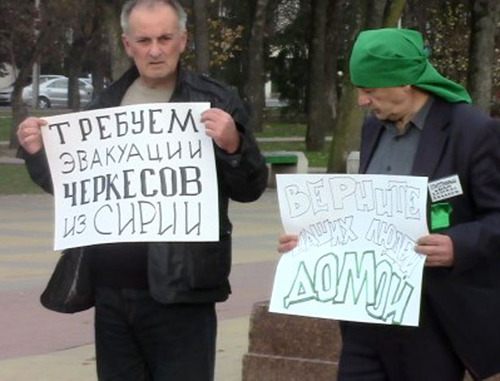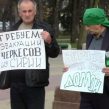
Circassian Activists Seek Assistance of Ukraine for Recognition of ‘Genocide’
Publication: Eurasia Daily Monitor Volume: 11 Issue: 102
By:

On May 26, the Adygean branch of the Russian Ministry of Interior’s department for fighting extremism summoned Circassian activists who signed a petition asking Ukraine to recognize the Circassian “genocide.” Prosecutors and police officers questioned activists Aslan Shazzo, Adnan Khuade, Evgeny Tashu and Ilyas Soobtsokov about various aspects of their petition. Shazzo, who heads the Natpress information agency, said the interrogations were clearly meant to harass Circassian activists. Asked why the petition was directed at Ukraine, Soobtsokov said Circassians must seek assistance from all countries and would be happy to see Russia recognize the Circassian “genocide” (https://adygeia.kavkaz-uzel.ru/articles/243420/).
Russian-Ukrainian relations are at their lowest point in decades, and Circassian activists have naturally attempted to make use of this opportunity to put pressure on Russia, even though they realize that the current regime in Moscow will be unaffected by this move. Still, Ukraine’s possible recognition of the mass killings of Circassians in the 19th century would make the Circassian claim of “genocide” stronger, given the fact that Georgia recognized it back in 2011.
Shazzo stated his view on the recognition of the Circassian “genocide”: “Why do we demand Russian recognition of genocide? Because our state does everything it can to prevent the return of Circassians to their homeland. The President signs the law on compatriots that designates as such only Russian-speakers and those who belong to Russian culture. So, the Circassians who live abroad are not included in this category. They return to their homeland according to a [different] law about foreign citizens and face all kinds of hurdles!” According to Shazzo, some Circassians from the diaspora are even prepared to move their capital to the North Caucasus, if they are allowed to come and settle in their homeland, but Russian authorities quietly discourage them from doing so by imposing severe visa restrictions and subjecting them to harassment. Even the humanitarian crisis in Syria, where many ethnic Circassians reside, did not alter Russian policies toward the Circassian diaspora. In fact, Moscow reduced the quotas for work permits for foreigners in Adygea from 1,000 to 350 per year, as the Circassian activists used them to resettle Circassian refugees from Syria in their historical homeland in the North Caucasus (https://kavpolit.com/articles/cherkesy_poprosili_ukrainu_priznat_genotsid_chtoby-5307/).
On May 20, Circassian activists from the North Caucasus and Circassian supporters from other countries addressed a petition to the speaker of the Ukrainian parliament, Oleksandr Turchynov, asking him to recognize the Circassian “genocide” by the Russian Empire in 18–19th centuries. The petition said that over half of the Circassians were annihilated by the Russian army or died as a result of a planned famine. The remaining Circassians were deported to the Ottoman Empire. Those actions left less than 5 percent of the original Circassian population in their homeland in the North Caucasus. Circassians currently reside in more than 50 countries and total about 7.5 million people abroad and about 1 million in the Russian Federation. Even now, according to the authors of the petition, Moscow is keen on creating the conditions for an economic downturn in the North Caucasus to induce Circassian youth to migrate elsewhere in Russia. The petition also expressed strong support for the Ukrainian people “in their struggle to retain their unique identity and the sovereignty of Ukraine” and protested Russian attempts to invade Ukrainian territory. The petitioners wished the Ukrainian nation “perseverance in its struggle against all attempts to Russify it” (https://www.natpress.info/index.php?newsid=8989).
Such a petition required significant courage on the part of its signatories in contemporary Russia and it strongly reverberates with the Circassians’ own story in the North Caucasus. The authorities apparently were caught off guard, so all they could do was try to scare the activists through official interrogations that were filmed. Later, on May 30, in another government-orchestrated response, the Council of the Elders of Adygea issued a statement condemning the authors of the petition, claiming that it was a “provocation” (https://www.natpress.info/index.php?newsid=9019).
As Aslan Shazzo pointed out, the Russian government has infiltrated Circassian organizations in the North Caucasus, co-opting their leadership and excluding uncooperative activists. This process, however, has resulted in a high level of public distrust of such “official” organizations and new grassroots organizations have emerged to represent the Circassian public. Generational change also is taking place in Circassian organizations elsewhere—for example, in Turkey (https://kavpolit.com/articles/cherkesy_poprosili_ukrainu_priznat_genotsid_chtoby-5307/).
Commenting on the ongoing attempt to oust the president of Abkhazia, which appears to have succeeded (https://www.civil.ge/eng/_print.php?id=27296), the Israeli expert on Circassia, Avrom Shmulevich, said that it could affect the situation across the North Caucasus. According to Shmulevich, Moscow’s support for the rebellion in eastern Ukraine is having a backlash in Russia-dominated Abkhazia and may spread to other areas, including the North Caucasus (https://avrom-caucasus.livejournal.com/361841.html).
The Circassian-populated republics will be especially affected by what happens in Abkhazia, given the close relations between the Abkhaz and their ethnic kin in the North Caucasus—the Circassians. With Russia and Ukraine having entered a period of extended rivalry, many disaffected nationalities in Russia, including the Circassians, will turn their attention to Ukraine to seek assistances, and Kyiv may work out some form of governmental policy once the situation in eastern Ukraine stabilizes. Former Georgian president Mikheil Saakashvili has been playing a major role in advising key members of the new Ukrainian government and he might use his ties to the team of newly elected President Petro Poroshenko to help it develop policies and strategies toward the North Caucasus that resembled his own previous government’s soft power initiatives. It was his government that first recognized the Circassian “genocide” on May 20, 2011.
Russia’s less than covert intervention in eastern Ukraine has resulted in Moscow’s deployment of the so-called “Vostok” battalion that reportedly consists of Chechens and other ethnic groups from the North Caucasus (see EDM, May 30). Resentment is seething inside Ukraine against Moscow’s use of North Caucasians because of this, and Kyiv would likely have a highly receptive audience among Circassian should it start to listen to their demands.




